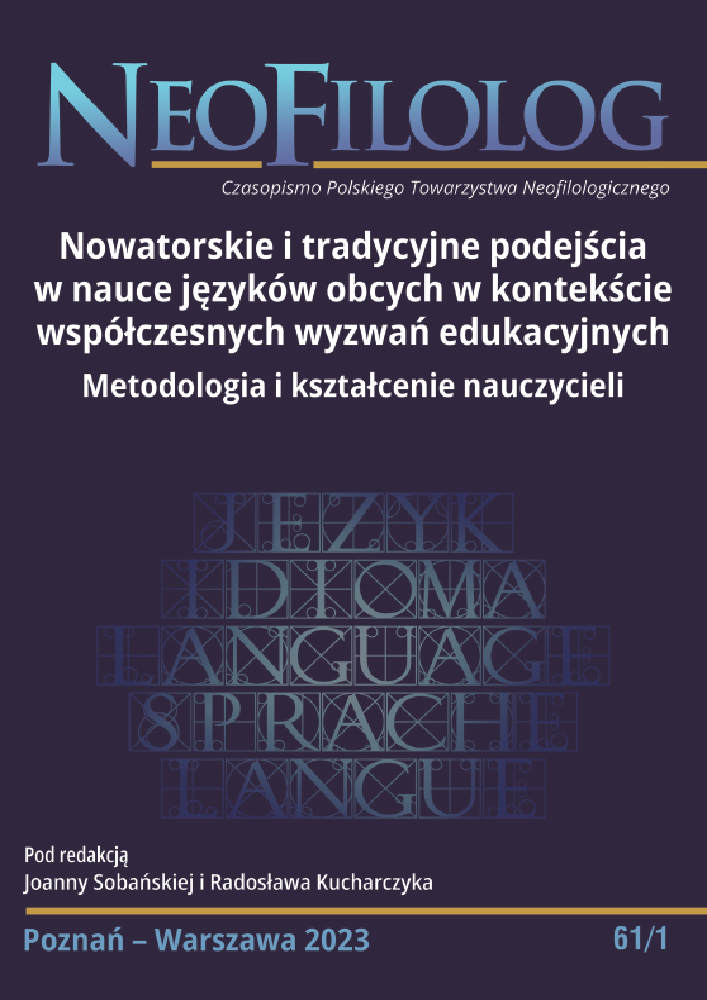Abstract
Microteaching as a specific method in foreign language teacher education in which theoretical knowledge is put into practice, offers prospective teachers systematic, small-step and practice-oriented training of teaching behaviour and teaching skills in the form of classical microteaching (practical exercises in small groups of students), or peer teaching (training in small groups of fellow students). Due to the pandemic-related switch to digital teaching formats in university foreign language teacher training, microteaching also had to be moved from the traditional classroom to the digital space and had to face completely new challenges. The paper aims to explore the method of microteaching from a theoretical and empirical perspective and to demonstrate its possibilities and limitations in the digital format, using the example of a microteaching course with students at the Faculty of Philosophy, University of Sarajevo, Bosnia and Herzegovina. Results of a survey among future teachers of German as a foreign language on the effectiveness of microteaching in the digital format in the times of the coronavirus pandemic will be presented.
References
Allen D.W., Ryan K.A. (1972), Microteaching. Weinheim und Basel: Beltz Verlag.
Amobi F.A. (2005), Preservice Teachers´ Reflectivity on the Sequence and Consequences of Teaching Actions in a Microteaching Experience. „Teacher Education Quarterly“, Nr. 32 (1), S. 115–128.
Chatzidimou K.D. (2012), Microteaching als erlebnis- uind handlungsorientierte Methode im Rahmen der Lehrerausbildung und der Didaktik. Frankfurt am Main: Peter Lang. DOI: https://doi.org/10.3726/978-3-653-01543-0
Çubukçu F. (2010), Congruence and dissonance between micro-teaching and macro-teaching. „Procedia Social and Behavioral Sciences“, Band 2, S. 326–329. DOI: https://doi.org/10.1016/j.sbspro.2010.03.019
Ersin P., Atay D., Mede E. (2020), Boosting Preservice Teachers´ Competence and Online Teaching Readiness through E-Practicum during the COVID-19 Outbreak. „International Journal of TESOL Studies“, Nr. 2 (2), S. 112–124.
Graber J., Fuchs T., Schmid-Kühn S.M. (2022), Lehrer*in werden in Corona-Zeiten. Eine qualitative Studie zur Professionalisierung von (angehenden) Lehrkräften unter Pandemie-Bedingungen. „HLZ – Herausforderung Lehrer*innenbildung“, Nr. 5 (1), S. 391–409.
Havers N., Toepell S. (2002), Trainingsverfahren für die Lehrerausbildung im deutschen Sprachraum. „Zeitschrift für Pädagogik“, Nr. 48 (2), S. 174–193.
He C., Yan C. (2011), Exploring authenticity of microteaching in pre-service teacher education programmes. „Teaching education”, Nr. 22 (3), S. 291–302. DOI: https://doi.org/10.1080/10476210.2011.590588
Helmke A. (2014), Unterrichtsplanung und Lehrerprofessionalität – Diagnose, Evaluation und Verbesserung. Seelze-Velber: Klett Kallmayer.
Ismail S.A.A. (2011), Student Teachers´ Microteaching Experiences in a Preservice English Teacher Education Program. „Journal of Language Teaching and Research”, Nr. 2 (5), S. 1043–1051. DOI: https://doi.org/10.4304/jltr.2.5.1043-1051
Karakaş A., Yeşilyurt Y.E., Candan E. (2022), Pre-service English teachers´ emergency remote microteaching experiences and adjustments: Growing gains and lessening pains, (in:) Önal A., Büyükkarci K. (Hrsg.), Essentials of foreign language teacher education, S. 173–198. ISRES.
Kast B. (1994), Lehrertraining durch Microteaching. „Fremdsprache Deutsch. Zeitschrift für die Praxis des Deutschunterrichts“, Sondernummer, S. 59–65.
Klinzing H.G. (2002), Wie effektiv ist Microteaching? Ein Überblick über fünfunddreißig Jahre Forschung. „Zeitschrift für Pädagogik“, Nr. 48 (2), S. 194–214.
Kokkinos T. (2022), Student Teachers and Online Microteaching: Overcoming Challenges in the Age of the Pandemic. „European Journal of Educational Research“, Nr. 11 (3), S. 1897–1909. DOI: https://doi.org/10.12973/eu-jer.11.3.1897
König J., Gerhard K., Jäger-Biela D.J. (2022), Practical learning opportunities and changes in teachers’ self-efficacy beliefs: Does the development of bachelor student teachers’ competence differ before and during COVID-19?. „Zeitschrift für Bildungsforschung“, Nr. 12, S. 217–234. Online: https://doi.org/10.1007/s35834-022-00357-3. DOI: https://doi.org/10.1007/s35834-022-00357-3
Kusmawan U. (2017), Online Microteaching: A Multifaceted Approach to Teacher Professional Development. „Journal of Interactive Online Learning“, Nr. 15 (1), S. 42–56.
Mahmud Y.S. (2021), Online Teaching and Learning Online Microteaching: A Transformation of Teaching Practices in Teacher Education During the Covid-19 Pandemic, (in:) Murtiningsih S.R., Lestari I.W., Hatmanto E.D. (Hrsg.), Best practices and research in ELT classrooms. Pustaka IlmuS. 113–122.
Mavruk G. (2018), Microteaching in der universitären Lehrerausbildung. Rekonstruktion studentischer Erfahrungsräume im Berufsfeldpraktikumim Bereich Deutsch als Zweitsprache. Münster: Waxmann.
Ögeyik M.C. (2009), Attitudes of the Student Teachers in English Language Teaching Programs towards Microteaching Technique. „English Language Teaching“, Nr. 2 (3), S. 205–212. DOI: https://doi.org/10.5539/elt.v2n3p205
Olivero J.L., Brunner R. (1973), Microteaching – ein neues Verfahren zum Training des Lehrverhaltens. München: Ernst Reinhardt Verlag.
Tschupke S. (2021), Microteaching im digitalen Raum: Eine Chance für den Erwerb digitaler Kompetenzen in der Ausbildung von Lehrenden in den Gesundheitsberufen. „Pädagogik für Gesundheitsberufe“, Nr. 1 (8), S. 81–87.
Zifreund W. (1966), Konzept für ein Training des Lehrverhaltens mit Fernseh-Aufzeichnungen in Kleingruppen-Seminaren. Berlin: Cornelsen.
License
Copyright (c) 2023 Lara Hedžić

This work is licensed under a Creative Commons Attribution-NoDerivatives 4.0 International License.
Authors
Authors of texts accepted for publication in Neofilolog are required to complete, sign and return to the Editorial team’s office the Agreement for granting a royalty-free license to works with a commitment to grant a CC sub-license.
Under the agreement, the authors of the texts published in Neofilolog grant Adam Mickiewicz University in Poznań a non-exclusive, royalty-free license and authorize the use of Attribution-NoDerivatives 4.0 International (CC BY-ND 4.0) Creative Commons sub-license.
The authors retain the right to the free disposal of the work.
Users
Interested Internet users are entitled to use works that have been published in Neofilolog since 2017, under the following conditions:
▪ attribution – obligation to provide, together with the distributed work, information about the authorship, title, source (link to the original work, DOI) and the license itself.
▪ no derivatives – the work must be preserved in its original form. Without the author's consent, it is not possible to distribute the modified work in the form of translations, publications, etc.
Copyrights are reserved for all texts published since 2017.
Miscellaneous
Adam Mickiewicz University in Poznań retains the property right as a whole (layout, graphic form, title, cover design, logo etc.).

